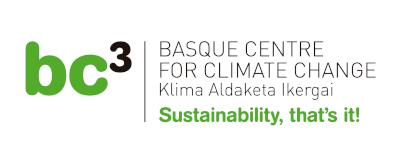Partners
Basque Centre for Climate Change (BC3)

Basque Centre for Climate Change (BC3), is an is an Excellence Research Centre based in the Basque Country (Spain), created in 2008, jointly promoted by the Basque Government and the University of the Basque Country. BC3´s mission is to strategically foster co-production of knowledge relevant to decision making by integrating environmental, socioeconomic and ethical dimensions of climate change.
The BC3 hosts an interdisciplinary team, led by renowned Climate Change expert, Prof. Maria Jose Sanz, connected to main institutions, scientific networks and socioeconomic players. As of 2018, BC3 relies on a multidisciplinary team of 46 researchers and 5 management staff. For the past decade, our contribution to research of climate change and to the science-policy interface places us in a unique position to offer knowledge, tools and new methodologies that we aim toward action and shared work to design and help to apply policies aimed at sustainable development.
The BC3 Strategic Plan (2018-2021) is aligned with six objectives and two cross cutting themes, which include a further step moving towards solutions co-designed with decision makers in the post-COP21 and Sustainable Development Goals world (transdisciplinary science).
The organization of the five BC3 Research Lines and Groups, responds to the Overall objectives and are as follows: 1) Climate Basis, 2) Low-Carbon Society, 3) Terrestrial Ecosystems, 4) Adaptation Lab, 5) Integrated Modelling of Coupled Human-Natural Systems.
As a result of its international research, BC3 was named in 2013 the Top European Climate Think Tank by the International Center for Climate Governance (ICCG). The ICCG Climate Think Tank Ranking assessed 260 of most prominent climate think tanks centres and research groups working on the field of climate change economics and policy. Despite of the substantial increase in competing institutions, in the last 5 years, BC3 has always been included in the top ten ranking. BC3 was awarded in March 2015 by the European Commission with the “HR Excellence in research”. In July 2018 BC3 has received the María de Maeztu credential This credential brings 2 million euro to the Basque Centre for Climate Change. BC3 is among the 7 organisations distinguished as María de Maeztu units of excellence.
Currently, BC3 is participating in more than 26 projects funded by external organizations, being around 70% international projects. BC3’s funding model is based on competitive funding, coming generally from public sources (average in the period 2014-2017 94%). The rest of funds sources are, non-competitive public sources (average in the period 2014-2017 1%), competitive private sources (average in the period 2014-2017 2%) and non-competitive private sources (average in the period 2014-2017 2%).
As of funds coming from the European Commission, BC3 has attracted 10 FP7 collaborative projects, 12 collaborative projects H2020, 1 ERC Starting Grant, 1 MSCA Individual Fellowship and 2 MSCA Global Fellowship grant. The success rate of BC3 in FP7 exceeded the 40% and in H2020 is around 20%.



